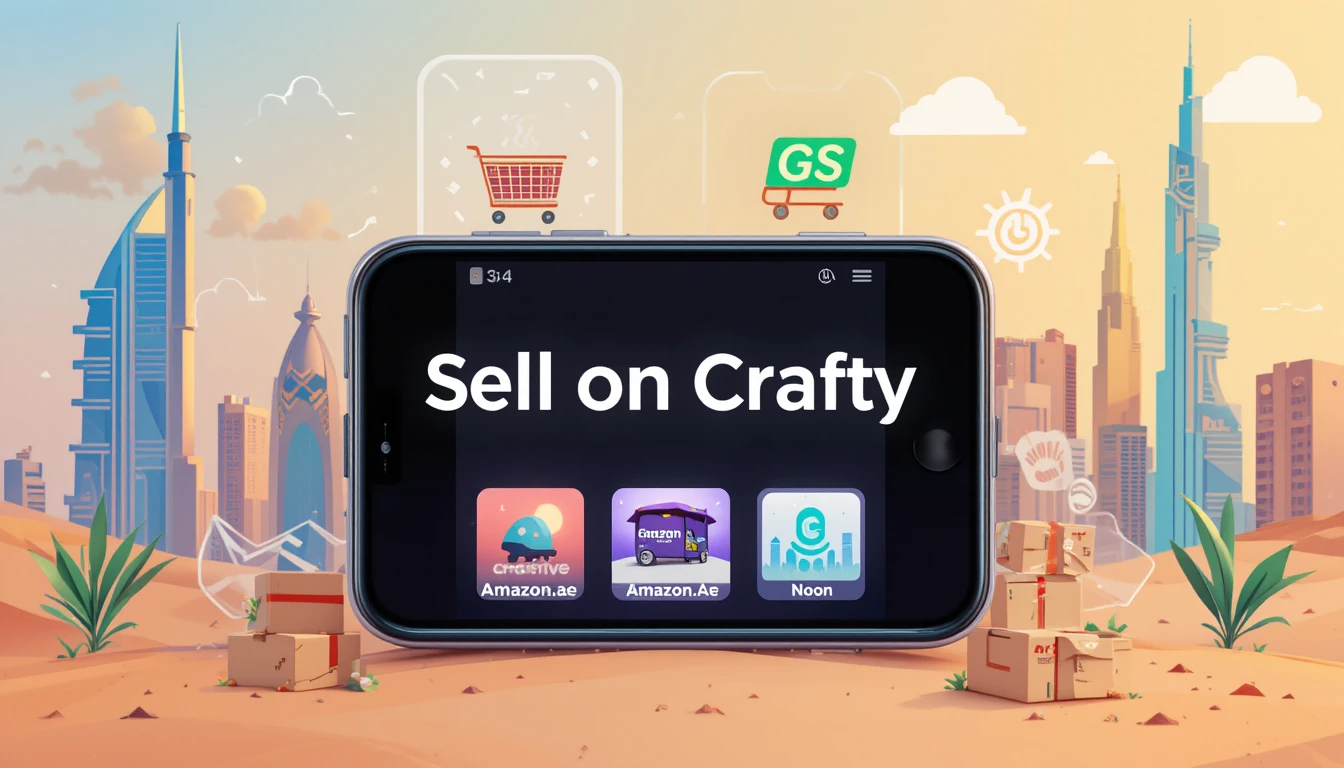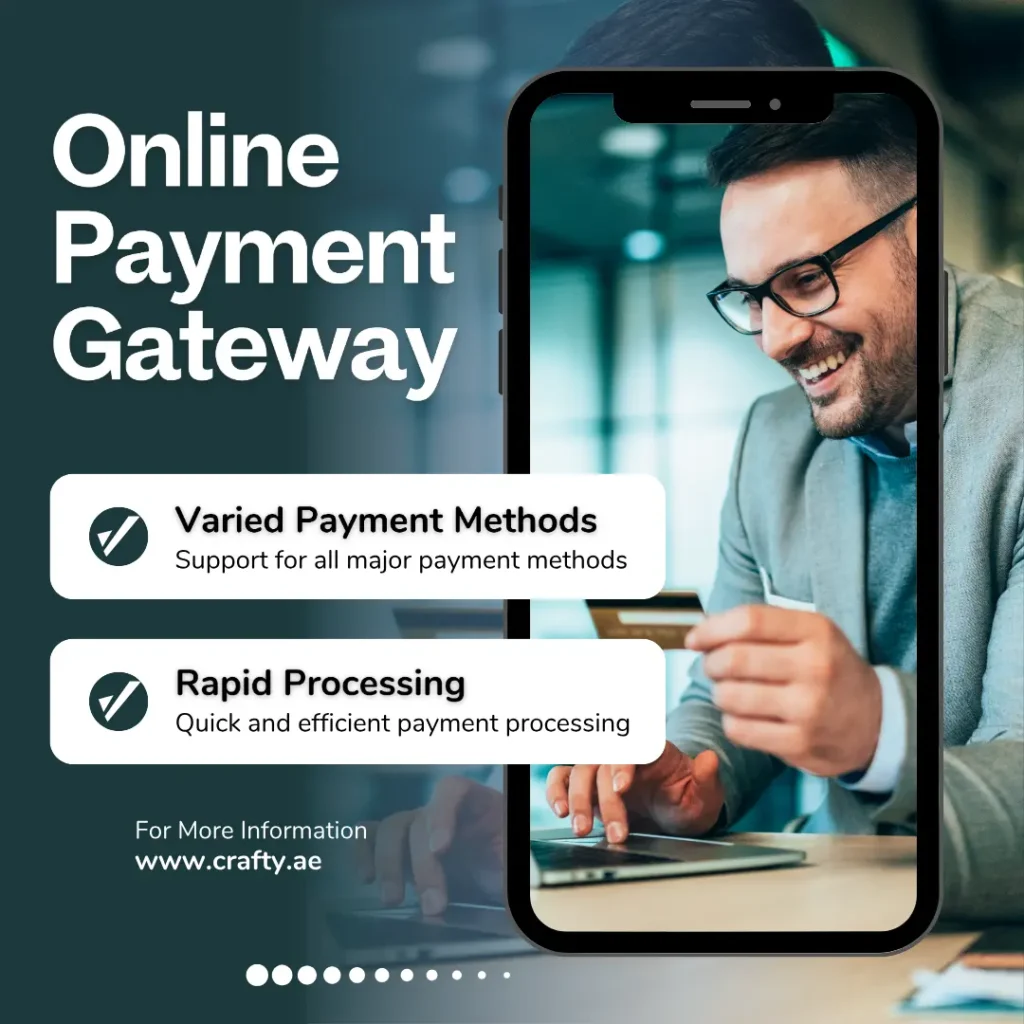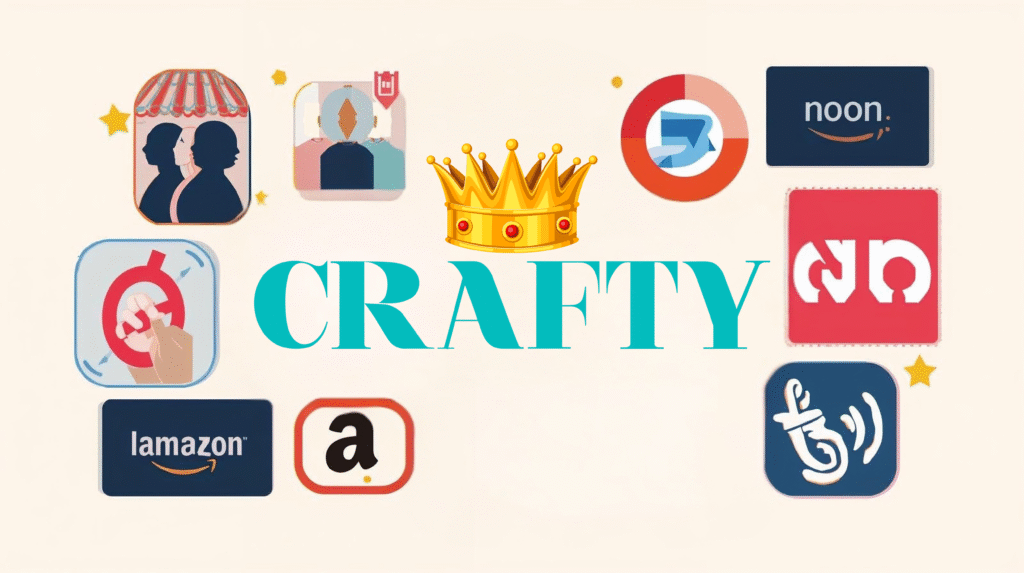Choosing the right online marketplace in the UAE can feel like navigating a vast desert full of potential, yet daunting with countless paths. Many businesses find themselves overwhelmed by the sheer number of options, hidden costs, complex logistics, and the ever-evolving legal landscape. This uncertainty often leads to missed opportunities, wasted resources, and frustration for entrepreneurs eager to tap into the booming UAE e-commerce market.
This comprehensive guide is designed to cut through the confusion, offering clarity and actionable insights. We’ll explore the top online marketplaces in the UAE, providing a transparent breakdown of their features, fees, and ideal use cases. By the end of this guide, you’ll not only understand where to sell your products online in the UAE but also possess the strategic knowledge to choose the platform that best aligns with your business goals, ensuring a smoother journey from setup to scale.
What is an Online Marketplace & Why Sell in UAE?
In today’s digital economy, selling through an online marketplace isn’t just a convenient option it’s a strategic imperative. For entrepreneurs and business owners in the UAE, these platforms represent a powerful Launchpad into a thriving and future-ready e-commerce ecosystem.
What Is an Online Marketplace?
An online marketplace is a centralized digital platform where multiple third-party sellers can list, market, and sell their products to a broad audience. Think of it as a virtual shopping mall but with powerful infrastructure behind the scenes.
Most marketplaces handle key operational components such as:
- Payment processing
- Order fulfillment and logistics
- Customer service management
- Security and dispute resolution
These platforms eliminate the need for business owners to build, maintain, or market their own independent e-commerce websites drastically reducing setup time and upfront costs.
Why Sellers Are Choosing Online Marketplaces
For UAE-based sellers, marketplaces offer not just convenience but high-leverage opportunities for scale and brand visibility.
Top Benefits of Selling Through Marketplaces:
- Instant Market Access
Tap into an existing, loyal customer base that actively shops online. - Lower Startup Costs
Avoid the expense of web development, payment gateways, and third-party logistics setups. - Established Brand Trust
Platforms like Amazon.ae, Noon, Carrefour and Crafty enjoy high consumer confidence, which extends to your products. - Logistics & Fulfillment Support
Many marketplaces offer optional FBA-style fulfillment services, making shipping and returns smoother for sellers. - Built-in Marketing Opportunities
Gain visibility through internal search engines, flash sales, and seasonal promotions powered by the platform.
The Booming UAE E-commerce Landscape
The UAE is fast becoming one of the Middle East’s most advanced e-commerce hubs and the numbers back it up, especially regarding the future of handmade.
Market Growth & Projections (2024 2025):
According to the Dubai Chamber of Commerce and Statista, the UAE e-commerce market:
- Surpassed AED 27 billion in online sales in 2023
- Is expected to grow at a CAGR of 10.4% through 2028
- Boasts an 88% internet penetration rate and one of the world’s highest smartphone usage levels
- Features over 9 million online shoppers, many of whom prefer mobile purchases
[Source: Dubai Future Foundation, UAE Ministry of Economy, Euromonitor]
Why the UAE Is a Strategic E-commerce Hotspot:
- Hyper-Connected Consumers
A young, tech-savvy population with a high demand for convenience and mobile commerce. - Government-Driven Innovation
Initiatives like Dubai Digital Economy Strategy and Smart Dubai actively support e-commerce development. - Geostrategic Advantage
The UAE’s central location enables efficient shipping to GCC, Africa, and Europe. - Robust Infrastructure
High-end logistics, warehousing, and fintech ecosystems simplify the operational side of selling. - Affluent Consumer Base
With strong purchasing power, UAE residents are willing to spend on premium and imported products.
Key Factors to Consider When Choosing a Marketplace
Selecting the right online marketplace is a strategic decision that can significantly impact your business’s success. It requires a thorough evaluation of various critical factors.
1. Target Audience & Product Category Fit
Why it matters: Reaching the right customers begins with choosing a platform aligned with your audience’s habits, values, and expectations.
Audience Alignment: Does the marketplace attract your ideal customer profile? For example, Amazon.ae has a wide demographic reach, while Mumzworld targets parents. For handmade creators and craft sellers on a crafty, choosing a marketplace that values artisan products and supports independent makers is key.
Category Compatibility: Is your product category actively sold and searched for on this platform? Tech gear thrives on Noon, while fashion sees high traction on Namshi.
For a crafty’s community of handmade artists, platforms that showcase unique, creative, or one-of-a-kind items like artisanal handmade soaps and artisan candles for home decor tend to tend to perform better.
Generalist vs. Niche: Consider whether your product fits better in a mass-market platform (Amazon, Noon) or niche-focused platforms (e.g., The Luxury Closet for designer items).
Sellers on a crafty may find better alignment and visibility on niche or curated platforms that emphasise craftsmanship and creativity, for instance, for artisan wedding favors.
Cultural Relevance: Platforms in the UAE cater to a multicultural audience. Understanding preferences (e.g., Arabic-first content, halal-certified products) can enhance appeal and trust especially important when selling handmade or culturally inspired crafts through a crafty or similar local-first platforms.
Expert Insight:
“In the UAE, platforms that accommodate local languages, shopping behaviors during Ramadan, or offer cash-on-delivery often perform better with Emirati and expat customers alike.”

2. Fee Structures & Profitability
Why it matters: Fees can quietly erode your profits if not accounted for from day one.
- Commission Rates: Ranges typically from 5% 20% depending on category and platform.
- Listing Fees: Some platforms charge per product, while others offer free listings with backend fees.
- Subscription Costs: Amazon.ae, for instance, requires a monthly seller subscription (~AED 160/month).
- Payment Processing Fees: Evaluate per-transaction charges on top of platform commission.
- Hidden Costs: Advertising, storage, late delivery penalties all impact your net earnings.
| Platform | Commission Rate | Subscription | Listing Fee | Payment Delay |
| Amazon.ae | 6 20% | AED 160/month | None | 7-14 days |
| Noon | 4 27% | None | AED 2/product | 14 -30 days |
| Carrefour | Varies by SKU | Case-by-case | Yes (SKU setup) | 30 days+ |
| Crafty | 10% | Free | None | 14-30 days |
Expert Tip:
Before setting prices, analyze your competitor’s listings on the same marketplace and factor in all deductions to maintain healthy margins.
3. Logistics & Fulfillment Options
Why it matters: Delivery speed and reliability directly affect customer satisfaction and your seller ratings.
- Marketplace Fulfillment (FBN, FBA-equivalent):
Services like Fulfilled by Noon (FBN) or Amazon Fulfillment simplify inventory storage, packing, and delivery. - Self-Fulfillment (Seller-Managed):
Requires integration with local courier services (e.g., Aramex, Quiqup, Emirates Post). - Returns Management:
Platforms often impose specific return policies be sure to review restocking fees, item conditions, and return shipping responsibility. - Delivery Expectations in UAE:
Customers expect next-day or same-day delivery, especially in cities like Dubai and Abu Dhabi.
Expert Tip:
For startups, using marketplace fulfillment can reduce overhead and customer service issues freeing up time to focus on sales.
4. Payment Systems & Payout Cycles
Why it matters: Delays in cash flow can hinder reinvestment, especially for small businesses.
- Supported Payment Methods: Ensure compatibility with cash-on-delivery, credit/debit cards, and BNPL options (Buy Now, Pay Later).
- Payment Frequency:
Varies by platform Amazon.ae pays bi-weekly, Noon typically pays monthly. - Minimum Payout Thresholds:
Some platforms require minimum AED balances before releasing funds. - Currency & Conversion:
International sellers should check AED conversion fees and settlement time.

Pro Tip:
Maintain a 4-week buffer in inventory or marketing spend to offset delayed disbursements.
5. Seller Support & Platform Tools
Why it matters: A smooth seller experience makes scaling easier and more sustainable.
- Onboarding Ease: Some platforms require licensing documents and in-person verification.
- Seller Dashboard: Features like order tracking, inventory alerts, and performance analytics.
- Customer Service Support: Availability of local-language help, seller helplines, and training webinars.
- Promotional Features:
Discounts, coupons, and advertising tools (e.g., Noon’s Sponsored Ads) help drive product visibility.
Expert Tip:
Opt for platforms offering performance analytics dashboards with insights like best-selling SKUs, bounce rates, and cart abandonment crucial for data-driven decisions.
6. Competition & Differentiation
Why it matters: Saturated marketplaces make visibility a challenge and a clear brand edge a necessity.
- Competitive Saturation: Use platform search and category filters to estimate how many similar products are listed.
- Differentiation Strategies:
- High-resolution product images
- Localized SEO keywords
- Unique product bundles
- Clear USPs (e.g., made in UAE, eco-friendly)
- Conversion Optimization: Ensure clear CTAs, mobile-friendly listings, and verified customer reviews.
Expert Tip:
Optimize listings with UAE-specific keywords (e.g., “Dubai same-day delivery,” “halal skincare,” “GCC warranty”) to boost visibility and conversions.
7. Legal & Regulatory Compliance in the UAE
Why it matters: Operating without proper licenses or VAT registration may result in heavy fines or business suspension.
- Business Licensing:
Required for most marketplaces. Options include:- DED License (Dubai mainland businesses)
- E-commerce License via Free Zones like Dubai CommerCity, Sharjah Media City, etc.
- VAT Compliance:
Register with FTA (Federal Tax Authority) if your annual revenue exceeds AED 375,000. - Consumer Rights Law:
Be transparent in return/refund policies, warranties, and product descriptions to comply with Federal Law No. 15 of 2020 on consumer protection.
Expert Tip:
Partner with a UAE-based PRO or licensing consultant to fast-track registration and avoid documentation delays.
Top Online Marketplaces in UAE: In-Depth Overviews
Here’s a detailed look at the leading online marketplaces in the UAE, along with niche platforms, to help you understand their unique propositions.
1. Amazon UAE
- Overview: Global e-commerce giant with a massive reach in the UAE.
- Pros: Enormous customer base, strong brand recognition, robust logistics (FBA), comprehensive seller tools, extensive product categories.
- Cons: High competition, complex fee structure, strict seller performance metrics, potential for brand dilution.
- Ideal Use Cases: Businesses seeking broad market access, scalable growth, and leveraging FBA for logistics; suitable for a wide range of products.
2. Noon
- Overview: Homegrown Middle Eastern e-commerce platform, strong competitor to Amazon.
- Pros: Strong regional focus, competitive fees, growing customer base in UAE/KSA/Egypt, good logistics options (FBN), local market understanding.
- Cons: Still maturing compared to Amazon, less international brand recognition, some categories less developed.
- Ideal Use Cases: Businesses targeting the MENA region, looking for a strong local alternative to Amazon, and seeking a growing platform.
3. Dubizzle
- Overview: Primarily a classifieds platform for new and used goods, but also has a significant B2C segment.
- Pros: High traffic for specific categories (e.g., cars, property, used electronics), direct buyer-seller communication, lower fees for direct sales.
- Cons: Less structured payment/logistics support, more focused on C2C or direct B2C listings rather than traditional e-commerce fulfillment.
- Ideal Use Cases: Sellers of used items, niche services, or businesses that prefer direct negotiation and handling their own logistics.
4. Sharaf DG Marketplace
- Overview: Online extension of the popular electronics retailer, focusing on consumer electronics and home appliances.
- Pros: Established brand trust in electronics, targeted audience for tech products, potential for cross-promotion with Sharaf DG’s retail presence.
- Cons: Niche focus (limited product categories), smaller overall customer base compared to general marketplaces.
- Ideal Use Cases: Businesses selling electronics, gadgets, home appliances, or related accessories.
5. Carrefour UAE Marketplace
- Overview: The online marketplace of the well-known hypermarket chain, expanding beyond groceries.
- Pros: High brand loyalty, access to a large existing customer base, good for everyday essentials, groceries, and a growing range of general merchandise.
- Cons: Primarily known for groceries, may be less suitable for specialized or luxury items, potentially high competition in popular categories.
- Ideal Use Cases: Sellers of FMCG, household items, groceries, and general merchandise looking to tap into Carrefour’s customer base.
6. crafty
Overview:
a crafty is a UAE-based niche online marketplace dedicated to handmade, artistic, and creative products. Built specifically for local artists, crafters, and small creative businesses, it provides a curated space to sell unique, one-of-a-kind items to customers who appreciate craftsmanship.
• Pros:
- Focused exclusively on handmade and artisan goods
- Lower competition compared to mass-market platforms
- Built-in storytelling features for artists (e.g., artist profiles, product background)
- Supportive creative community and local seller tools
- Attracts an audience actively looking for unique, creative, and meaningful products
- UAE-based with cultural alignment and bilingual support (Arabic/English)
• Cons:
- Smaller customer base compared to platforms like Amazon or Noon
- Limited product categories (non-handmade or mass-produced items not accepted)
- Less suitable for sellers aiming for mass production or high-volume retail
• Ideal Use Cases:
d Sentence:
Perfect for artists, crafters, handmade product makers, including those creating
unique handmade mugs, local creatives, and small businesses focused on original, custom, or artisan goods.
Especially valuable for those who want to build a brand and connect with customers who value authentic, creative craftsmanship in the UAE and GCC region.
6. Niche UAE Marketplaces You’re Missing Out On
- Unique Angle: Beyond Amazon & Noon: Niche UAE Marketplaces You’re Missing Out On (and Why They Matter for Specific Businesses).
- Mumzworld:
- Overview: Leading e-commerce site for baby, child, and mother products in the MENA region.
- Pros: Highly targeted audience, strong brand reputation in its niche, less competition than general marketplaces.
- Cons: Extremely niche-specific, limited product categories.
- Ideal Use Cases: Businesses selling baby products, toys, maternity wear, and parenting essentials.
- Namshi:
- Overview: Prominent online fashion and beauty destination in the Middle East.
- Pros: Strong brand presence in fashion, targeted fashion-conscious audience, good for apparel, footwear, and beauty products.
- Cons: Niche-specific, high competition within the fashion sector, strong brand requirements.
- Ideal Use Cases: Fashion brands, clothing retailers, footwear specialists, and beauty product sellers.
- Expert Tip: Explore Niche Marketplaces: For specialized products, investigate smaller, more focused platforms that cater directly to your target audience for potentially higher conversion rates and less competition.

Comparison Table of Top UAE Marketplaces
A comprehensive table summarizing key features of the top online marketplaces in the UAE for quick reference and direct comparison, enabling sellers to make informed decisions.
| Marketplace | Target Audience | Commission/Fees (Typical Range) | Ease of Setup | Logistics Support Options | Payment Cycle | Best For (Seller Type/Products) |
| Amazon UAE | Broad consumer base, all demographics | 8-15% (varies by category) | Medium | FBA, Seller-fulfilled | Bi-weekly | High-volume sellers, diverse product ranges |
| Noon | Broad MENA consumer base, value-conscious | 7-12% (varies by category) | Medium | FBN, Seller-fulfilled | Bi-weekly | Growing businesses, regional focus |
| Dubizzle | Local buyers/sellers, used goods focus | Primarily listing fees (low) | Easy | Seller-fulfilled | Direct | C2C, used items, local services |
| Sharaf DG Marketplace | Tech enthusiasts, electronics buyers | 10-15% (electronics focused) | Medium | Seller-fulfilled | Monthly | Electronics, home appliances |
| Carrefour UAE Marketplace | General consumers, grocery focus | 5-10% (varies by category) | Medium | Seller-fulfilled | Monthly | FMCG, general merchandise, everyday essentials |
| Mumzworld | Parents, families (baby/child products) | 15-20% (niche specific) | Easy | Seller-fulfilled | Monthly | Baby products, toys, maternity |
| Namshi | Fashion-conscious, youth demographic | 20-25% (fashion/luxury specific) | Medium | Seller-fulfilled | Monthly | Fashion, apparel, beauty |
Problem/Solution: Overcoming Common Seller Challenges in UAE Marketplaces
Selling online in the UAE comes with its unique set of challenges. Here, we address common pain points and provide actionable solutions.
1. Overwhelmed by Marketplace Options
Problem: With dozens of platforms available from Amazon.ae to niche options like Sivvi or The Luxury Closet, choosing the right one can feel paralyzing.
Agitate: Making the wrong choice may result in poor sales, misaligned audiences, and wasted setup costs.
Solution:
- Prioritize based on your product type, target audience, and budget.
- Start small: choose one or two platforms that best fit your business, then scale as you grow.
- Leverage data from marketplace analytics, seller groups, and industry forums.
2. High Commission Fees & Hidden Costs
Problem: Commission rates, payment processing fees, listing charges, and promotional costs often eat into profit margins.
Agitate: These fees are not always transparent upfront, leading to miscalculated pricing strategies.
Solution:
- Read the fine print: Always review fee breakdowns before signing up.
- Incorporate all costs into your pricing model include logistics, VAT, and advertising.
- Negotiate better rates if you are a high-volume seller (available on some platforms).
Expert Tip:
Research competitor pricing within the same platform and apply a competitive pricing strategy that balances visibility and profitability.
3. Navigating Legal, Licensing, and VAT Requirements
Problem: Confusion around licensing, tax registration, and e-commerce compliance.
Agitate: Failure to comply can result in account suspensions, fines, or being barred from operating in the UAE.
Solution:
- Obtain the correct license (e.g., DED or free zone e-commerce license).
- Understand VAT thresholds (AED 375,000 for mandatory registration).
- File and collect VAT accurately via the UAE Federal Tax Authority (FTA) portal.
Expert Tip:
Rely on official resources:
4. Logistics, Shipping & Returns Management
Problem: Delayed deliveries, damaged shipments, and messy return processes hurt customer satisfaction.
Agitate: These issues lead to negative reviews, reduced visibility, and possible account restrictions.
Solution:
- Use Fulfilled by Noon (FBN) or Amazon Fulfillment for hands-off logistics.
- If managing your own logistics, partner with trusted couriers (e.g., Aramex, Quiqup).
- Offer clear shipping and return timelines, especially during peak seasons.
Expert Tip:
Choose fulfillment services that offer real-time tracking, free return pickups, and localized delivery support for faster, safer customer experiences.
5. Intense Competition & Standing Out
Problem: With hundreds of similar products listed, it’s easy to get buried.
Agitate: Even if your product is high quality, poor presentation or generic listings can kill sales.
Solution:
- Optimize listings with:
- High-resolution images
- Detailed, localized descriptions
- Relevant keywords (Arabic + English)
- Invest in marketplace advertising to boost exposure.
- Focus on USPs (e.g., “Made in UAE,” “Eco-friendly,” “Free Next-Day Delivery”).
Expert Tip:
Use UAE-relevant keywords like “Dubai fast delivery,” “Cash on Delivery available,” or “Halal-certified” to attract regional shoppers.
6. Inventory Management Across Channels
Problem: Managing multiple platforms without centralization leads to overselling, stock outs, or data confusion.
Agitate: Customer trust drops with repeated stock issues, and platforms may penalize inconsistent sellers.
Solution:
- Use inventory management software (e.g., Zoho Inventory, Expandly, or local POS systems).
- Update stock levels daily automate where possible.
- Consider central warehousing if selling across Amazon, Noon, and your own store.
7. Cultural Nuances & Consumer Behavior
Problem: Failing to align with local expectations can reduce brand trust and relevance.
Agitate: UAE customers value trust, convenience, and cultural compatibility missteps here cost conversions.
Solution:
- Use Cash on Delivery still preferred by many UAE buyers.
- Align promotions with major shopping events: Ramadan, Eid, National Day, White Friday.
- Translate listings to Arabic and use culturally sensitive product images or packaging.
Expert Tip:
Study UAE consumer reports and cultural trends from sources like Dubai Economy, Statista MENA, and local retail associations.
8. Managing Customer Service & Reviews
Problem: Slow response times, poor after-sales service, and negative reviews can quickly hurt your seller credibility.
Agitate: Marketplaces prioritize sellers with strong reputations weak customer service affects both visibility and trust.
Solution:
- Set up automated responses and live chat tools where available.
- Monitor reviews actively and respond to every review (positive or negative) to show credibility.
- Encourage happy customers to leave feedback through packaging inserts or post-purchase messages.
Expert Tip:
Prioritize exceptional customer service timely communication and proactive solutions can turn unhappy customers into loyal brand advocates.
Checklist: Your Pre-Launch Guide for Selling on a UAE Marketplace
Before you go live, ensure you’ve covered all essential steps for a smooth and successful launch.
Legal & Business Setup
Why it matters: Operating legally in the UAE is non-negotiable. Marketplaces often verify trade licenses and VAT registration before allowing you to sell.
- Obtain your trade license (e.g., Dubai Economic Department (DED) e-commerce license or free zone alternatives).
- Register for VAT with the Federal Tax Authority if your revenue exceeds AED 375,000/year.
- Open a corporate bank account in the UAE (required for marketplace payouts).
E-E-A-T Tip: Always consult official UAE government portals like https://ded.ae or https://tax.gov.ae for the latest legal requirements.
2. Product Sourcing & Inventory Management
Why it matters: Product delays or stock outs can lead to negative reviews and lost sales, especially in high-demand categories.
- Vet and contract reliable suppliers (local or international).
- Secure sufficient starting inventory based on demand forecasts.
- Set up an inventory tracking system (manual spreadsheet, POS software, or e-commerce tool).
3. Marketplace Account Setup
Why it matters: Each platform has a unique onboarding process and seller criteria.
- Select your primary marketplace(s) (e.g., Amazon.ae, Noon, Carrefour).
- Complete the seller registration with accurate business details and documents.
- Link your UAE corporate bank account for seamless payouts.
4. Product Listing Optimization
Why it matters: Your product listings are your storefront compelling content increases visibility and drives conversions.
- Capture high-quality product images (multiple angles, lifestyle use, white background).
- Write detailed, keyword-rich titles and descriptions (include relevant Arabic keywords if targeting local users).
- Select accurate categories and product tags.
- Set competitive pricing, factoring in commissions, VAT, and shipping.
Expert Tip:
Use UAE-specific terms like “Cash on Delivery,” “Dubai fast shipping,” or “Ramadan offer” in your listings to increase local search visibility.
5. Logistics & Fulfillment Strategy
Why it matters: Delivery reliability directly affects your brand reputation.
- Decide between marketplace fulfillment (e.g., Amazon Fulfilled, Noon FBN) or self-fulfillment.
- If self-fulfilling, partner with reputable couriers (Aramex, Quiqup, etc.).
- Plan for order processing, packaging, and dispatch timelines.
6. Customer Service & Returns Plan
Why it matters: Fast, friendly, and professional customer service drives loyalty and positive reviews.
- Set up customer service protocols (response times, FAQ scripts, escalation processes).
- Understand each marketplace’s return policy and your obligations.
- Prepare for refund scenarios and inventory reconciliation.
Expert Tip:
Monitor and respond to reviews within 24 hours. Engaging with customer feedback shows professionalism and boosts seller credibility.
7. Marketing & Promotion Strategy
Why it matters: Without traffic, even the best products won’t sell.
- Prepare introductory ad campaigns using marketplace advertising tools (e.g., Sponsored Products on Amazon).
- Plan for seasonal sales participation (White Friday, Ramadan, UAE National Day).
- Consider external traffic strategies like social media ads or influencer partnerships to direct users to your listings.
8. Performance Monitoring & Analytics Setup
Why it matters: Data is your greatest ally when optimizing listings and scaling your business.
- Familiarize yourself with your seller dashboard and analytics tools.
- Define Key Performance Indicators (KPIs) such as:
- Conversion rate
- Order defect rate
- Return rate
- Sales by SKU
- Schedule weekly reviews to optimize product performance, pricing, and ad spend.
Expert Tip:
Track patterns in peak sales hours, top-performing categories, and repeat customers to refine targeting and stock planning.
Future Trends in UAE E-commerce and Marketplaces
The UAE e-commerce landscape is constantly evolving. Staying ahead of emerging trends is crucial for sustained success.
Rise of Social Commerce
What’s happening:
Platforms like Instagram, TikTok Shop, and Snapchat are transforming from content hubs into full-scale sales channels. Consumers are increasingly buying directly within social feeds, often driven by influencer recommendations or viral content.
What it means for sellers:
- Integrate your catalog with Meta Commerce Manager and TikTok Shop.
- Use shoppable videos, reels, and stories to drive conversions.
- Leverage UAE-based micro-influencers to reach niche audiences authentically.
Actionable Tip:
Combine marketplace selling with social selling by using product tags and localized hashtags (e.g., #DubaiStyle #RamadanDeals).
2. Quick Commerce (Q-Commerce)
What’s happening:
Consumers in the UAE now expect ultra-fast delivery often in under 60 minutes for essentials like groceries, personal care, and household items.
Platforms enabling Q-commerce:
- Talabat Mart, NowNow, Careem Quik, and Noon Minutes are leading the charge.
- Integrated with dark stores and hyper-local fulfillment centers.
What it means for sellers:
- If you sell consumables or fast-moving items, consider partnering with Q-commerce platforms.
- Invest in real-time inventory sync and on-demand delivery networks.
3. AI & Personalization
What’s happening:
AI tools are powering smart recommendations, chatbots, search optimization, and even automated pricing strategies.
What it means for sellers:
- Use marketplace analytics and AI tools to personalize offerings based on browsing and buying behavior.
- Adopt AI-driven platforms (like Amazon’s machine-learning-based suggestions) to improve conversion rates.
Actionable Tip:
Leverage third-party tools like Shopify Magic, ChatGPT, or Trellis for personalized ad copy, automated support, and dynamic pricing.
4. Sustainability in E-commerce
What’s happening:
UAE consumers are increasingly environmentally conscious. Sustainability now influences purchasing decisions especially among Gen Z and millennial shoppers.
What it means for sellers:
- Offer eco-friendly products and highlight sustainability attributes (e.g., biodegradable packaging, carbon-neutral shipping).
- Use green labels or certifications (like FSC, EcoCert) to build trust.
Actionable Tip:
Include a “Sustainability Statement” in your product descriptions or storefront to show your commitment to ethical practices.
5. Augmented Reality (AR) Shopping
What’s happening:
AR is being integrated into online platforms, allowing users to virtually try on fashion, test makeup, or visualize furniture in their space.
What it means for sellers:
- Use AR tools or partner with platforms that offer “Try Before You Buy” capabilities.
- Greatly reduce return rates by improving buyer confidence pre-purchase.
Example:
Brands selling on Amazon.ae or Shopify Plus can integrate AR preview features using apps like ModiFace (beauty) or ViewAR (home goods).
6. Diversification of Payment Methods
What’s happening:
Digital payment innovation is accelerating. From BNPL (Buy Now, Pay Later) to digital wallets (e.g., Apple Pay, Tabby, Postpay) and even crypto, customers expect flexible, fast, and secure options.
What it means for sellers:
- Offer a variety of payment methods to reduce cart abandonment.
- Ensure your marketplace or payment gateway supports regional wallets and BNPL integrations.
Expert Tip:
Highlight “Buy Now, Pay Later” options directly in your product listings it can significantly boost conversion rates for higher-ticket items.
7. Multi-Channel Selling Is the New Normal
What’s happening:
Reliance on a single marketplace is becoming risky. Sellers are embracing multi-channel strategies combining marketplaces, social commerce, branded websites, and even B2B portals.
What it means for sellers:
- Use centralized tools (like Shopify, Expandly, or Zid) to manage inventory and orders across channels.
- Target different audience segments across platforms while maintaining brand consistency.
Expert Tip:
Diversify Sales Channels to minimize revenue risks and expand your reach. A blend of Amazon.ae + Noon + social media + your own site = greater control, visibility, and resilience.
Conclusion
Navigating the vibrant, yet complex, world of online marketplaces in the UAE is a journey filled with immense opportunity. By understanding the unique characteristics of each platform, meticulously evaluating your business needs against key criteria, and proactively addressing potential challenges, you can lay a strong foundation for e-commerce success.
Remember, the “best” marketplace isn’t a one-size-fits-all answer; it’s the one that aligns perfectly with your product, target audience, and operational capabilities. Armed with the insights from this guide from in-depth comparisons to actionable checklists and expert tips you are now better equipped to make informed decisions, optimize your online presence, and thrive in the dynamic UAE digital market. Embrace the journey, stay agile, and watch your business flourish online.
